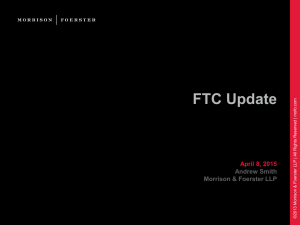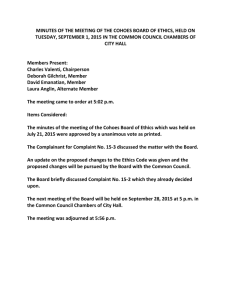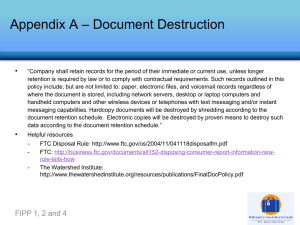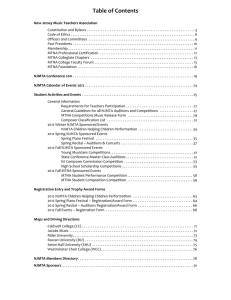FTC Enforcement Actions Continue At the September, 2013 Board
advertisement
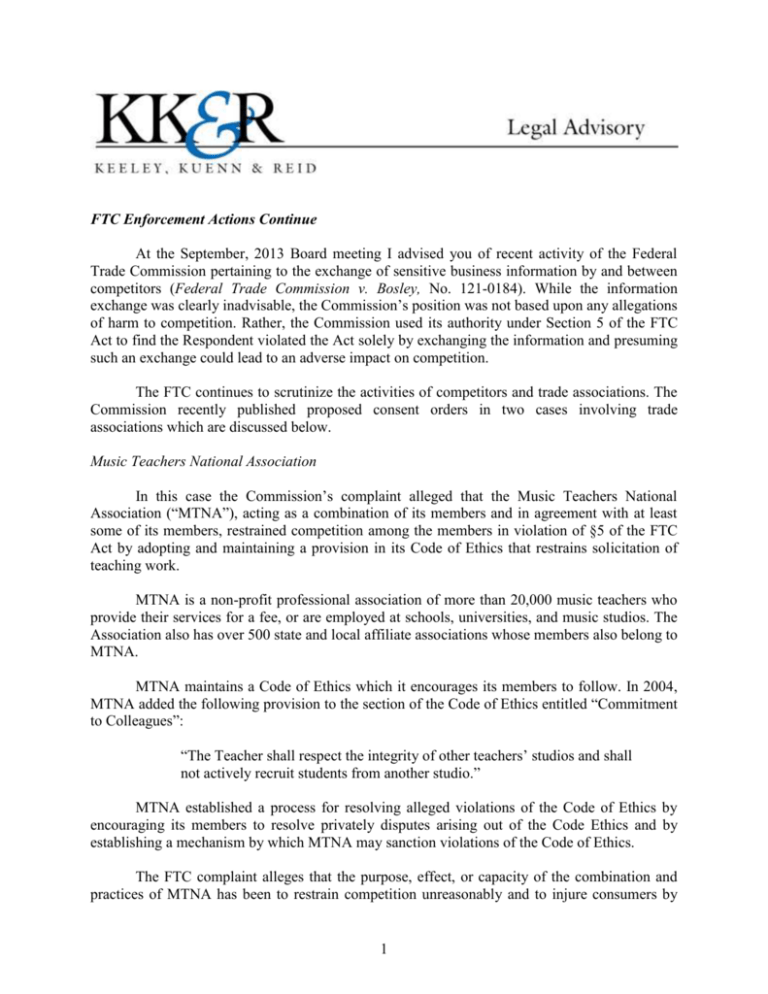
FTC Enforcement Actions Continue At the September, 2013 Board meeting I advised you of recent activity of the Federal Trade Commission pertaining to the exchange of sensitive business information by and between competitors (Federal Trade Commission v. Bosley, No. 121-0184). While the information exchange was clearly inadvisable, the Commission’s position was not based upon any allegations of harm to competition. Rather, the Commission used its authority under Section 5 of the FTC Act to find the Respondent violated the Act solely by exchanging the information and presuming such an exchange could lead to an adverse impact on competition. The FTC continues to scrutinize the activities of competitors and trade associations. The Commission recently published proposed consent orders in two cases involving trade associations which are discussed below. Music Teachers National Association In this case the Commission’s complaint alleged that the Music Teachers National Association (“MTNA”), acting as a combination of its members and in agreement with at least some of its members, restrained competition among the members in violation of §5 of the FTC Act by adopting and maintaining a provision in its Code of Ethics that restrains solicitation of teaching work. MTNA is a non-profit professional association of more than 20,000 music teachers who provide their services for a fee, or are employed at schools, universities, and music studios. The Association also has over 500 state and local affiliate associations whose members also belong to MTNA. MTNA maintains a Code of Ethics which it encourages its members to follow. In 2004, MTNA added the following provision to the section of the Code of Ethics entitled “Commitment to Colleagues”: “The Teacher shall respect the integrity of other teachers’ studios and shall not actively recruit students from another studio.” MTNA established a process for resolving alleged violations of the Code of Ethics by encouraging its members to resolve privately disputes arising out of the Code Ethics and by establishing a mechanism by which MTNA may sanction violations of the Code of Ethics. The FTC complaint alleges that the purpose, effect, or capacity of the combination and practices of MTNA has been to restrain competition unreasonably and to injure consumers by 1 discouraging and restricting competition among music teachers in violation of §5 of the FTC Act. MTNA has entered into a Consent Order which, if approved, requires the Association to cease and desist from restraining or declaring unethical the solicitation of teaching work by its members; requires MTNA from maintaining a relationship with any affiliate that MTNA knows engages in conduct that restrains solicitation, advertising or price related competition by its members; and institute an anti-trust compliance program. California Association of Legal Support Professionals In this case, the FTC alleged that the California Association of Legal Support Professionals (“CALSPro”) violated §5 of the FTC Act by restricting, through its Code of Ethics, the ability of its members to compete on price, to solicit legal support professionals for employment and to advertise. CALSPro is a non-profit association of over 350 company and individual members in the business of providing support services to the legal community, including serving process, copying documents, filing documents in court, preparing subpoenas, searching records, locating people, and conducting private investigations. The FTC alleged in its complaint that CALSPro committed the following: “It is not ethical to cut the rates you normally and customarily charge when soliciting business from a member firm’s clients…” “It is not ethical to…speak disparagingly of another member.” “Never discuss the bad points of your competitor.” “It is unethical to contact an employee of another member firm to offer him employment with your firm without first advising the member firm of your intent.” CALSPro entered into a Consent Order which, if approved, requires the Association to cease and desist from restraining its members from engaging in price competition, solicitation of employees, or advertising; requires CALSPro to revise its Code of Ethics and notify its members that it has been changed; and institute an anti-trust compliance program. NLRB Drops Notice Posting Rule The National Labor Relations Board (NLRB) has abandoned its controversial rule that would have required nearly all private sector employers to post notices in the workplace, informing employees of their right to form or join a union and other rights under federal labor law. In mid-2013 two federal appeals courts invalidated the NLRB rule on statutory and 2 constitutional grounds. The agency let the January 2, 2014 deadline pass without seeking U.S. Supreme Court review of these adverse rulings. Despite this setback, the NLRB is expected to pursue its pro-labor agenda in 2014. The agency now has a fully confirmed five-member board for the first time in a decade. In a recent release, the Board reaffirmed its commitment to ensure that “workers, businesses and labor organizations are informed of their rights and obligations under the National Labor Relations Act” and promised the “NLRB will continue its national outreach program to educate the American public about the statute.” 3

